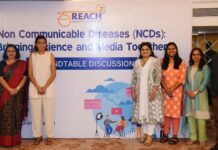New Delhi, May 09, 2018: Genome sequencing is driving innovative advances that will change human health across the world. Translation of academic research projects into clinical settings is already transforming detection and treatment of cancer and helping find answers for families with children having undiagnosed rare genetic disorders.
Watson and Crick developed the double helix structure of DNA in 1953, working from data generated by Rosalind Franklin and Maurice Wilkins. From here incremental developments in sequencing technology led to the conceptualisation of the Human Genome Project in 1987. Formally the initiative began in 1990 and was announced finished in April 2003. This first effort costed over $2.7 billion and the then President Bill Clinton describes it as “without a doubt, this is the most important, most wondrous map ever produced by humankind.” The presidential vision at that point of time was that “in coming years, doctors will increasingly be able to cure diseases like Alzheimer’s, Parkinson’s, diabetes, and cancer by attacking their genetic roots.”
While we haven’t quite cured cancer in the last 15 years however since then researchers across the world have made significant progress in terms of addressing tumour progression in cancer via targeted therapies also known as precision medicine. This has led to the launch of cancer fighting drugs that target specific geneticsignatures in a tumour replacing broad based therapies that used to prescribe earlier. We continue to make significant progress in terms of research in the area with institutions like National Institute of Biomedical Genomics (NIBMG), Tata Memorial Centre Advanced Centre for Treatment, Research and Education in Cancer (ACTREC) and many of our nodal cancer centers leading the way in India. In addition to this innovators including Medgenome, HealthCare Global Enterprises Ltd (HCG), Stand Lifesciences and many more are adding to this research and translating it into actionable results for patients across the country. Significant progress continues to happen in other areas including new born screening, diabetes, Parkinson’s and Alzheimer’s. The process of innovation in the space is a factor of time and data available for researchers, clinicians and geneticists to analyse.
Out of that first effort one of the factors holding up initial research was cost with the cost of sequencing the human genome starting at $100 million, however what has helped drive research in the space has been innovation in genome sequencing technology. The fall in cost of sequencing the whole human genome outstrips Moore’s Law, the projection by Intel co-founder Gordon Moore that computing would increase exponentially in power while decreasing in cost. As shown by the graph the cost of genome sequencing reduce to $4000 by 2013 to $1000 in 2015. Much of this innovation has been driven by Illumina, a San Diego based provider of sequencing technology with a market capitalisation of over $34 billion. In early 2017 at the launch of Illumina’s latest population sequencing platform the NovaSeq, Illumina’s CEO Francis deSouza laid down a road map for sequencing cost to come down to $100 within the next decade.
“With cost not holding up the ability to sequence the human genome over 500,000 human genomes sequenced by 2017 driven mostly by country level sequencing projects across the US, UK, Iceland, Netherlands, Japan, Finland, Sweden and other developed economies. However with the fall in cost of sequencing and a large body of work that correlates genomic data with observed biological data i.e Phenotype India is on the cusp of powering further innovation in the space.
Currently, a number of projects are being floated in India with a mandate of sequencing several thousand human genomes, exomes and metagenomes. These initiatives are building upon the work that has been done over the last two decades with a larger scope as the sequencing costs have plummeted dramatically. Once these studies are completed we will know more about the variations within the Indian population. Armed with this knowledge we can develop health strategies that are specific to genomic variations within the Indian population.” says Praveen Gupta, Managing Director of Premas Life Sciences.
Corporate Comm India(CCI Newswire)
























